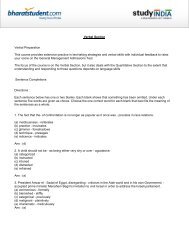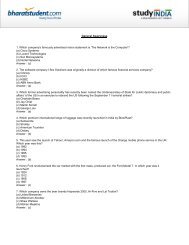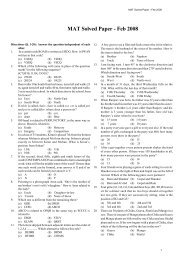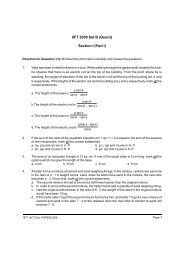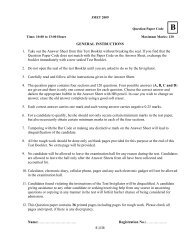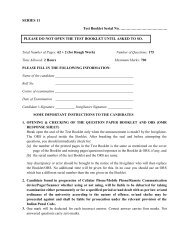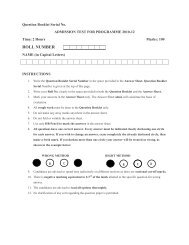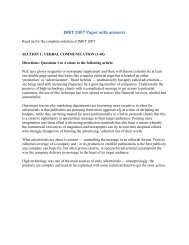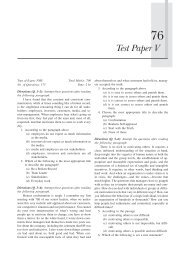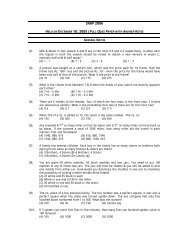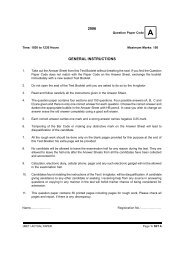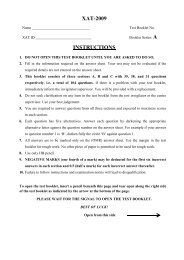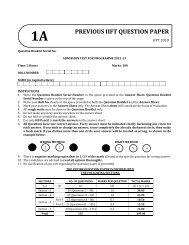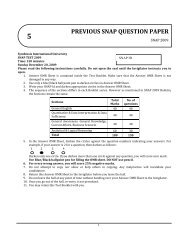PREVIOUS FMS QUESTION PAPER
PREVIOUS FMS QUESTION PAPER
PREVIOUS FMS QUESTION PAPER
You also want an ePaper? Increase the reach of your titles
YUMPU automatically turns print PDFs into web optimized ePapers that Google loves.
40. According to the author,<br />
(1) Khandwalla proposes a humane turnaround<br />
(2) Khandwalla proposes a surgical turnaround<br />
(3) Khandwalla proposes a mix of humane and<br />
surgical turnaround<br />
(4) None of the above<br />
41. According to the passage,<br />
(1) Effectiveness of ‘Pioneering – Innovative<br />
Management’ style is not dependent on<br />
situational factors<br />
(2) Situational factors have no influence on<br />
‘Pioneering – Innovative Management’ style<br />
(3) Effectiveness of ‘Pioneering – Innovative<br />
Management’ style is partially influenced by<br />
situational factors<br />
(4) Situational factors totally control ‘Pioneering –<br />
Innovative Management’ style<br />
42. Which of the following is a correct statement?<br />
(1) The present norms and managerial functions<br />
are influenced by 'Pioneering –<br />
Innovativeness'<br />
(2) 'Pioneering - Innovativeness' of the past has<br />
no significant influence on present norms and<br />
managerial functions<br />
(3) The ‘Pioneering – Innovativeness’ of the past<br />
has very little impact on present norms and<br />
managerial functions<br />
(4) None of the above<br />
43. Which of the following is NOT a correct statement?<br />
(1) The policy of recruiting creative managers at<br />
junior levels has direct impact on the current<br />
levels of ‘Pioneering – Innovative’<br />
management<br />
(2) Deliberate efforts to develop innovative<br />
business strategies has direct impact on<br />
‘Pioneering – Innovative’ management<br />
(3) Steps to inculcate innovative operating<br />
models has direct impact on ‘Pioneering –<br />
Innovative’ management<br />
(4) Past ‘Pioneering – Innovative’ management<br />
had influence on present business strategies<br />
PP-02 2A.12<br />
44. According to the passage,<br />
<strong>FMS</strong> Dec 2010<br />
(1) ‘Pioneering – Innovative’ management<br />
enhances performance<br />
(2) ‘Pioneering – Innovative’ management inhibits<br />
performance<br />
(3) ‘Pioneering – Innovative’ management controls<br />
performance<br />
(4) ‘Pioneering – Innovative’ management<br />
measures performance<br />
45. Which of the following is a correct statement?<br />
(1) ‘Pioneering – Innovative’ management is a<br />
result of top management policies and<br />
practices.<br />
(2) Management policies and practices are a result<br />
of ‘Pioneering – Innovative’ management.<br />
(3) 'Pioneering – Innovative’ management works<br />
well in a closed environment.<br />
(4) ‘Pioneering – Innovative’ management works<br />
well in a controlled environment.<br />
46. According to the passage,<br />
(1) Past practices of encouraging excellence had<br />
no influence on current ‘PI’ levels<br />
(2) Past practices of encouraging excellence<br />
influenced current ‘PI’ levels<br />
(3) Past ‘PI’ levels influenced current focus on<br />
excellence<br />
(4) Past ‘Pl’ levels influenced the current level of<br />
expertise.<br />
47. Which of the following is NOT a correct statement?<br />
(1) ‘PI’ management is characterised by an<br />
emphasis on innovation<br />
(2) Emphasis on high return on investment is<br />
characteristic of ‘PI’ management<br />
(3) Emphasis on high quality and low price is<br />
characteristic of ‘PI’ management<br />
(4) ‘PI’ management is characterised by an<br />
emphasis on being a pioneer<br />
48. Which of the following is a correct statement?<br />
(1) Khandwalla used a questionnaire to seek<br />
responses from 75 respondents.



